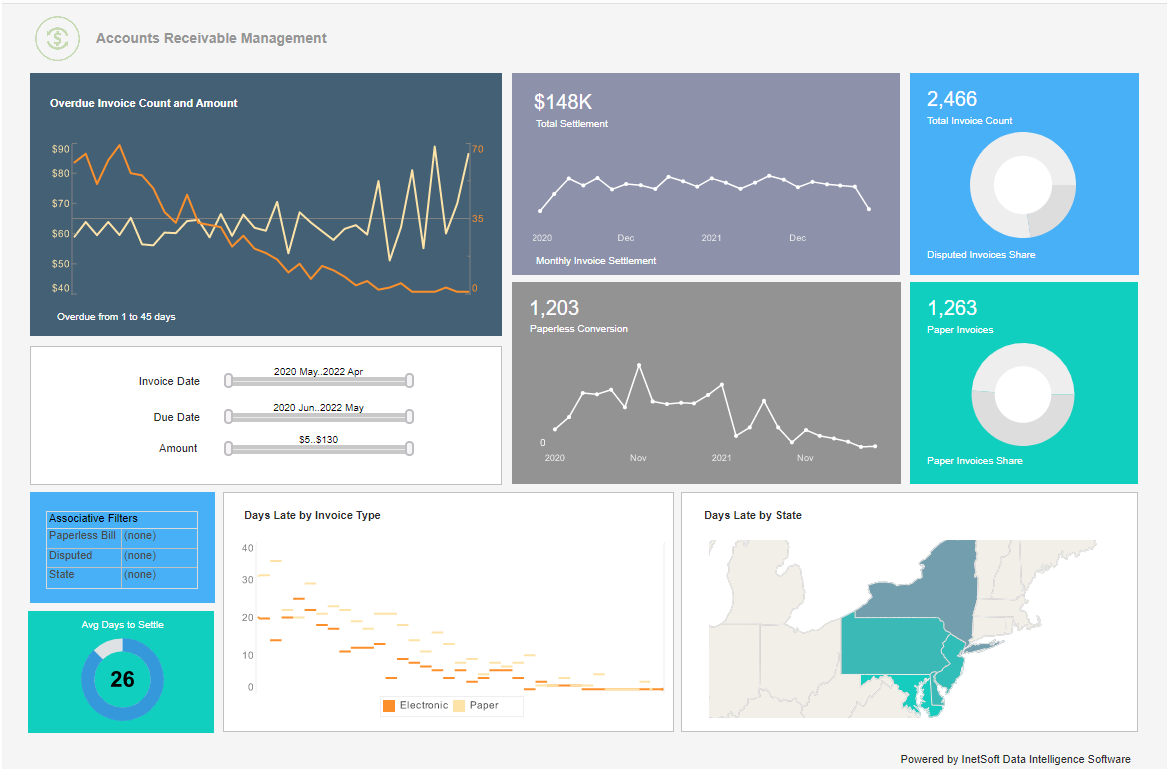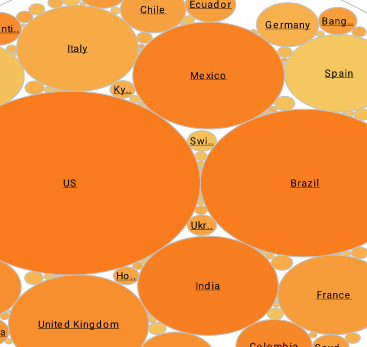What KPIs and Analytics Do FinOps Analysts Use?
The importance of the FinOps (Financial Operations) professional has grown as firms continue to reap the advantages of cloud computing. These people are in charge of overseeing the financial elements of cloud operations, such as budgeting, cost allocation, and cost optimization.
Key performance indicators (KPIs) and analytics are used by FinOps professionals to measure and evaluate their organization's cloud expenditures. We will examine some of the KPIs and metrics that FinOps professionals utilize most often in this post.
| #1 Ranking: Read how InetSoft was rated #1 for user adoption in G2's user survey-based index | Read More |
Cost optimization
Making ensuring that their organization's cloud expenditure is optimized to get the most value for the money invested is one of the main duties of FinOps professionals. They depend on KPIs and analytics to analyze expenditure patterns and pinpoint places where expenses may be cut in order to do this.
Cost per Unit of Work
The cost per unit of work is a significant KPI in this sector. This statistic calculates the expense of carrying out a certain job or activity in a cloud environment, such running a specific application or handling a specific volume of data. FinOps professionals may spot areas where costs are rising and take action to optimize expenditure in those areas by monitoring the cost per unit of work over time.
Proportion of Underutilized Resources
The proportion of underutilized resources is another significant KPI in this field. This measure keeps track of how much computational power or storage space that is allotted to the cloud but not actually utilized. FinOps professionals may cut expenses by reallocating underutilized resources to other areas or by eliminating them completely by detecting wasted resources.
 |
Learn about the top 10 features of embedded business intelligence. |
Budgeting
Budgeting is a crucial component of the FinOps professional's job. They have to make sure that their company's cloud expenditure remains under budget while also satiating business requirements. To do this, they depend on KPIs and analytics that monitor expenditure in relation to the budget and provide information on areas where spending is going above and beyond expectations.
Budget Variance
The budget variance is a crucial KPI in this field. This measure contrasts actual expenditure with planned spending to reveal areas where spending is more or lower than anticipated. FinOps professionals may take action to alter expenditure and make sure it remains under budget by seeing these deviations.
Forecasting Accuracy
Forecasting accuracy is a crucial statistic in this domain. This KPI assesses the precision of the organization's expenditure projections and sheds light on areas where spending is most likely to go over budget. FinOps professionals may prevent overspending and keep their organization's cloud expenditures on track by increasing forecasting accuracy.
 |
Learn the advantages of InetSoft's small footprint BI platform. |
Cost allocation
The proper distribution of cloud charges across the firm must also be ensured by FinOps professionals. This is necessary for proper financial reporting and to guarantee that each team or department is responsible for its own expenses. They depend on KPIs and analytics to manage expenditure by team or department and offer information on where money may be distributed more wisely.
Cost per Department
The cost per department is one important KPI in this area. This measure keeps track of how much money is spent on the cloud by team or department, giving information about where expenditures are greatest. FinOps professionals may collaborate with department heads to minimize expenditure and more efficiently distribute expenses by identifying these high-cost locations.
Cost per Employee
The cost per employee is yet another crucial indicator in this field. This KPI analyzes the average cost of cloud computing per user and sheds light on any areas where some individuals or teams may be paying more than others. FinOps professionals may collaborate with these high-cost customers to improve their cloud use and save expenses by identifying them.
Vendor management
FinOps professionals must manage vendor relationships and make sure that expenses are minimized across all providers as businesses depend more and more on a variety of cloud vendors to support their operations. In order to do this, they depend on key performance indicators (KPIs) and analytics that monitor expenditure by vendor and give insights into areas of the business where costs may be cut.
Vendor Expenditure
The vendor expenditure is one important KPI in this area. This measure keeps track of the amount spent on cloud services by vendor and sheds light on the most expensive sectors. FinOps professionals may negotiate better pricing or move expenditure to other suppliers by identifying these high-cost providers in order to reduce expenses.
Vendor Utilization
Vendor utilization is another crucial measure in this area. This KPI measures how well each cloud provider is used, giving insights into potential underutilization or opportunities for consolidation. FinOps professionals may save expenses and make sure that their organization's cloud investment is as effective as possible by optimizing vendor usage.
 |
Read how InetSoft saves money and resources with deployment flexibility. |
Performance optimization
The cloud environment inside their company must operate at peak efficiency, according to FinOps professionals. They depend on KPIs and analytics to measure performance indicators and spot opportunities for improvement in order to do this.
Reaction Time
The reaction time is an important KPI in this domain. This measure keeps track of how long it takes a certain cloud service or application to react to a user request. FinOps professionals may make sure that their organization's cloud infrastructure is operating at its peak efficiency and providing the best possible user experience by improving response time.
Resource Usage
The resource usage is a crucial statistic in this sector. This KPI measures how effectively cloud resources, such processing power or storage space, are being used. FinOps professionals may make sure that their organization's cloud infrastructure is operating effectively and that expenses are kept to a minimum by optimizing resource use.



